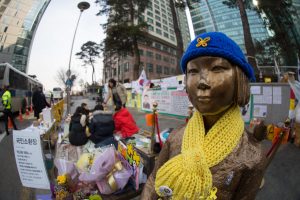An issue related to the “comfort women” has once again made headlines in South Korea – but this time, it’s an NGO dedicated to helping the women under fire.
Comfort women were women and girls forced into sexual slavery by the Imperial Japanese Army in occupied countries and territories before and during World War II. South Korea has been one of the most active countries in seeking redress for the women’s suffering, and it has been often a source of diplomatic disputes between Seoul and Tokyo.
But this time, a prominent South Korean activist who advanced the cause of former comfort women is at the center of attention.
Yoon Mi-hyang, president of the Korean Council for Justice and Remembrance for the Issues of Military Sexual Slavery by Japan, has been accused of misusing donations from the public meant to support the past victims.
The council, which was established in 1990, is a Korean nongovernmental organization advocating for the rights of the surviving comfort women and lobbying the Japanese government to make a full apology and offer compensation.
The organization has also played an important role in restoring the rights of the women, speaking out against war crimes against women, and promoting peace across Asia. Yoon is one of the most prominent figures at the council, and she was elected as a lawmaker with the ruling Democratic Party in the National Assembly election in April.
The allegation against Yoon emerged after former comfort woman Lee Yong-soo, 92, raised her suspicions over the way donations were used.
The group’s accounting practices have come under fire after Lee’s accusation. According to South Korean daily Chosun Ilbo, the council reported in 2018 to the national tax authorities that it paid about 34 million won to Diobruing Co., a firm that operates pub chain stores across the country, after the group held an event to promote the rights of comfort women.
However, Diobruing told Chosun Ilbo that the group only spent about 9.7 million won on that event, and of that the company returned about 5.4 million won to the group as a donation. If true, that would mean the council exaggerated its spending when reporting to the tax authorities.
The money the group claimed to have spent on that single event (about 34 million won) is more than the funds that went directly to help comfort women during the same year, about 23 million won.
The council responded to the Chosun Ilbo story by saying it had reported all expenses spent on all events held in that year as going to Diobruing. But that only raised more suspicion over the group’s accounting practices.
Amid the controversy, all eyes are on Yoon, who had been leading the group. Lawmakers from the opposition even called on her to resign her seat in the National Assembly.
Amid growing calls for the council to fully reveal its accounting history, the group held a press conference where Yoon admitted that there were mistakes in the organization’s accounting practices, which she chalked up to the nature of a civic group without enough people to handle heavy workloads.
Meanwhile, the group said it will continue its weekly Wednesday Demonstration regardless of the allegations and public criticism. Every Wednesday at noon since 1992, the organization has been hosting a demonstration with survivors of Japanese sexual slavery and sympathizers in front of the Japanese Embassy in Seoul. The demonstrations call for an end to violence against women during armed conflict and for justice and human rights.
Lee, however, also criticized the weekly protests, saying that “the rallies only teach young students hatred.” Lee said she would not participate any longer.
Many are demanding the group put the weekly protest on hold, at least until the allegations are cleared, but the group dismissed the calls, saying that some “domestic and international forces” are trying to deny the truth of the comfort women issue.
The weekly demonstration was held as usual on May 13, albeit with most supporters joining by livestream due to the COVID-19 pandemic. Some 2,500 people joined online, according to The Korea Herald.

































